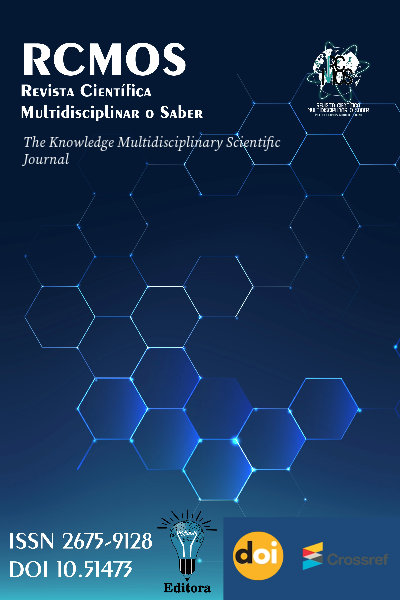Clean bar: no trash in city and river, recycling attitudes
Clean bar: no trash in city and river, recycling attitudes
DOI:
https://doi.org/10.51473/rcmos.v1i2.2021.37Keywords:
Environmental Education, Environment, RecyclingAbstract
Objectives: This study presents the results of the Barra Limpa project that was developed at the Júlio Müller State School, in the city of Barra do Bugres-MT. The aim of the project was to bring not only the school community but also the society closer to the environment, discussing environmental education, recycling of trash and also bringing information of an important scientific nature so that students can make their community a healthier place promoting integration between organizations that work with different dimensions of citizenship, making citizenship rights effective in the daily life of the population, brought schools and the community the knowledge necessary to build citizenship, involved different bodies that ensured the rights and duties of citizens. individual in society. Methodology: We carry out concrete actions such as technical study visits in some places, such as the Paraguay River, which is located in Barra do Bugres-MT, in vacant lots and in our own school, where the garbage was improperly deposited. Lectures were given to correctly orient the school community on water, hygiene methods, public safety. Results: We made alternative teaching materials using scraps, culminating with an exhibition of the works, the implementation in the school environment of a pilot project for the separation of garbage, the organization of an educational booklet. Conclusion: We realized with the development of the project a great change in the behavior of those who did not believe that each one doing their part, can instead make changes, and have a cleaner, healthier environment for all beings that Inhabit.
Downloads
References
ASSAD, Z. P. Legislação ambiental de Mato Grosso. Cuiabá: Editora de Liz, 2007.
BARBIERI, José Carlos. Desenvolvimento e Meio Ambiente: as estratégias de mudanças da Agenda 21, 3 ed. Petrópolis – RJ, 2000.
BRASIL. Parâmetros Curriculares Nacionais: meio ambiente, saúde. 3. ed. Brasília-DF: Ministério da Educação. Secretaria da Educação Fundamental, 2001.
BRASIL. Constituição da República Federativa do Brasil, de 05 de outubro de 1988. 6. ed. atual.
CARVALHO, I. C.de M. Educação Ambiental: A formação do sujeito ecológico. São Paulo: Cortez, 2004.
CARVALHO, I. C.de M. A invenção ecológica: sentidos e trajetórias da educação ambiental no Brasil. Porto Alegre: Editora da UFRGS, 2001.
DIAS, Genebaldo Freire. Educação ambiental: princípios e práticas. 7.ed. São Paulo: Gaia, 2001.
GRIPPI, S. Lixo Reciclagem e sua história. 2. ed. Rio de Janeiro, Interciência, 2006.
GRIPPI, S. Reciclagem e sua História. 1. ed. Rio de Janeiro, 2001.
JAPIASSU, H. F. Interdisciplinaridade e patologia do saber. Rio de Janeiro: Imago, 1976.
RASILCHIK, M. Prática de Ensino de Biologia. São Paulo: Editora da Universidade de São Paulo, 2005.
PAIVA, H.N.D.; GONÇALVES, W. Florestas Urbanas: planejamento para melhoria da qualidade de vida. Viçosa: Aprenda Fácil Editora, 2002, v.2.
ROUQUAYROL, M. Z; ALMEIDA FILHO, N. Epidemiologia e saúde. 5. ed. Rio de Janeiro: Medsi, 1999.
VALLE, C. Eyer. Qualidade ambiental: como ser competitivo protegendo o meio ambiente. São Paulo: Pioneira, 1995.
TRAVASSOS, E. Gomes. A prática da educação ambiental nas escolas. Porto Alegre, RS: Editora Mediação, 2.ed., 2006.
ZUBEN, F. V. Meio Ambiente, Cidadania e Educação. Campinas. Departamento de Multimeios. Unicamp. Tetra Pak Ltda. 1998.
Downloads
Published
Issue
Section
Categories
License
Copyright (c) 2021 Rosilene da Silva BARROS, Euvânia Dias Ferreira da COSTA, Marlene da Paixão COSTA, José Geraldo EDJARBAS, Pricila FABENI, Laura Cristina X. S. de M. GALVÃO, Marcia Regina Zotesso do NASCIMENTO, Luzia Maria Silva PERES, Sueli Marta ROCHA, Conceição Aparecida Gonçalves TAVARES, Marcia Conciane ZAGO (Autor/in)

This work is licensed under a Creative Commons Attribution 4.0 International License.






















